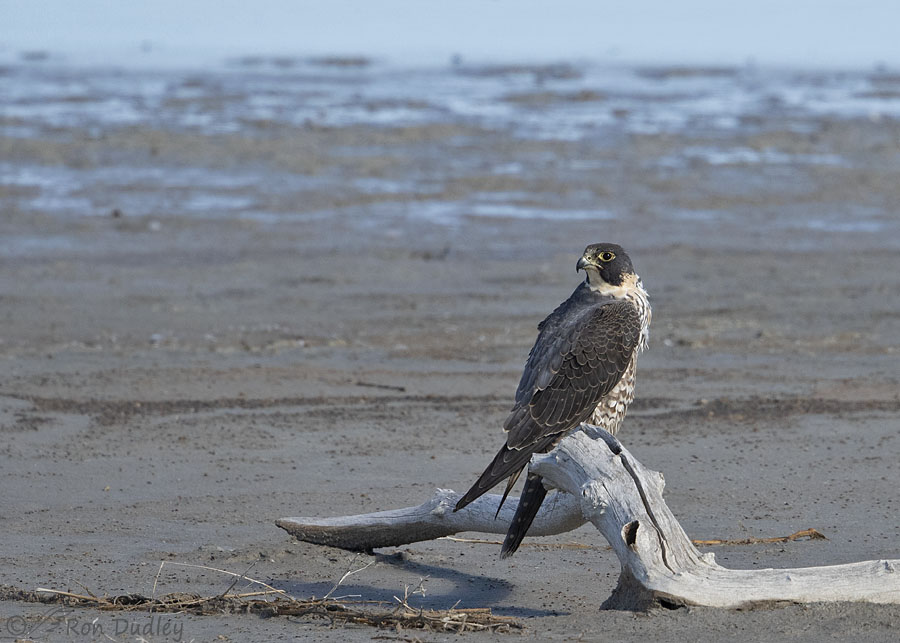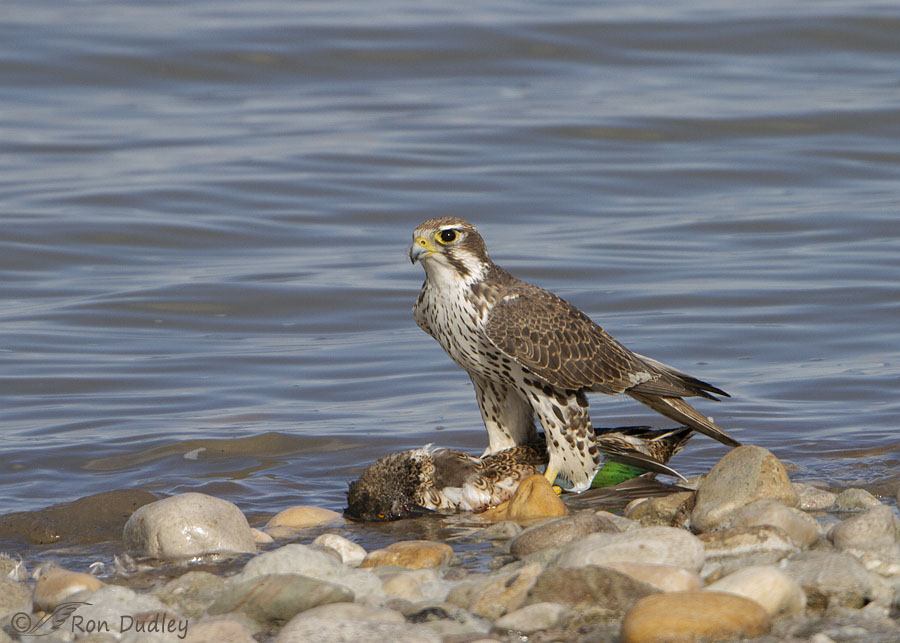Especially Peregrine Falcons and Prairie Falcons but other falcons too. Not to mention all the other birds that, directly or indirectly, rely on the lake,

Until just a few years ago the lake used to come right up to the Antelope Island causeway for much of its length. Many of my photos of falcons and other birds taken from the causeway include the lakeshore in the background, even at my extreme focal lengths. Ducks and shorebirds abounded and the predatory falcons took full advantage of the bounty.
This young Peregrine Falcon was resting between bouts of hunting waterfowl close to shore along the causeway. The photo was taken in March of 2016.

You’ve seen this Prairie Falcon before even though this photo is new to my blog. The falcon had killed the Shoveler out on the water and then waited for it to be blown to shore along the causeway before claiming its prize. The photo was taken in November of 2012.
Scenes like this just aren’t to be seen anymore. The shore of the lake is so far away from the island and causeway, and they’re separated by so much relatively sterile mudflat, that birds of any feather are few and far between.
It used to be far from uncommon to see Peregrine and Prairie Falcons along the causeway and on the island itself and during the winter I could almost count on seeing one of the larger falcon species on most trips I made to the island. But today I can’t even remember the last time I saw a Peregrine or Prairie on or near the island. They come for the ducks (mostly) and if there are no ducks they don’t come. If my hazy memory serves, the last one I saw was a lone Prairie Falcon some distance north of the island Manager’s residence and that was perhaps 2-3 years ago.
What’s happened and continues to happen to the lake makes me incredibly angry. The causes of the lake’s continuing rapid demise are complicated and nuanced but It didn’t have to be anywhere near this bad.
I thank my local and national politicians for that.
Ron
Notes:
- Even our smallest falcon, the American Kestrel, has been severely affected by the disappearing lake. They used to be fairly common on the north end of the island and very common along the causeway, especially on the east side. I rarely see them in either place these days.
- I’ve even photographed a rare-to-Utah Gyrfalcon along the causeway. It goes without saying that I haven’t seen another one.


This story — as do those along similar veins — breaks my heart and makes me so angry.
Drought and its incestuous cousin fire are killers. They really don’t need any assistance from us. Sadly they get it. By the bucket load.
I mourn with you. And the world.
Thanks, EC.
One of my daughter’s favorite sayings is “One day the earth will give a good shake like a mighty dog and rid itself of the humans parasites.” We might get there by our own making.
I really like your daughter’s saying April. It is on the money.
April, I’ve been feeling the preliminary shaking for a while now.
Not sure which is the stronger emotion evoked by your post today, sadness or anger at this loss of a vital resource. A healthy mix of both, along with that all-too-familiar feeling of helplessness because it really does seem like those with the power to take corrective actions refuse to pay attention.
Chris, those types will never pay attention to such things, not when there’s money to be made doing otherwise. I swear, they don’t give a shit about their grandkids, not really.
One of my favorite places to see winter raptors is the Klamath Basin on the California Oregon border. There, there is the same problem ; not enough water to share between farmers and wildlife.
I’m sorry to hear that, John.
Greed insures we get the government we deserve. And the birds and everything else get a world they don’t deserve.
I’m afraid you’re right, Lyle.
In the ’60s and ’70s, a number of books (Silent Spring, The Population Bomb, Diet for a Small Planet, etc.) laid out for the masses much of the intellectual and attitudinal groundwork for maintaining our planet’s wealth of life and species in the future.
For better or worse, human desires are diverse and don’t seem to allow us as a species to focus on ideals like peace (personal and international peace) and caring for the planet. As individuals we seem to have minimal control over our species. Yet we all have to experience the results.
Manifest Destiny is still the predominate belief.
Yup, especially in this state.
Well said, Nancy. The Population Bomb is what first inspired my environmental consciousness back in the late 60’s when I was assigned to read it in college. When I began teaching the following year I actually ordered a classroom set of that book (in paperback) for use in my classroom.
I know very little about the conditions up there Ron, but sure is a shame that the lake is in that bad a state. It has been a really tough year environmentally here in the west with the long drought and the vast number of forest fires and then here in Arizona lots of serious flooding when the monsoons came.
That is a really good photo of the Prairie Falcon. Hate to see him taking down one of my favorite ducks, but it is nature.
Thanks, Everett. What’s going on with the lake is tragic.
Ah Ron, so so sad…and here in W Massachusetts there is so so much rain. The forest around our house is like a huge green wall. You are welcome to visit any time…lots of birds!
That would really be going back to my roots, Mary. My direct paternal ancestors helped settle MA back in 1630.
A very sad tale you tell Ron. Too many people and too much greed. Yes the politicians did this. But they were put in positions of power by a public that did not care, or at least did not care enough, about what really matters, air, water and sustainable food. We already possess the solution to all our problems but not only will we not implement it, we will not even talk about it. Population control is our only hope. It is beginning to look like the sins of humanity are unforgivable.
Well said, Porcupine. Yes overpopulation is at the root of the problem but even with our current population things could be, and should have been, managed MUCH better.
My –admittedly fuzzy–understanding is that most of the input to the lake from
Bear River and other water sources has been diverted to agricultural and development uses…..is there
any kind of organized activism directed toward restoring diverted water
sources to the lake and to marshes upstream from it ? I’m remembering
with ironic sadness the year that figured in Terry Tempest Williams’ book,
“Refuge”…….
That’s correct, Kris – the primary water source of the lake is the Bear River (there are also others). Yes, there are groups and organizations opposing all the diversions to the river(s) but their opposition doesn’t sway the politicians. Too much money, potential profits, involved. You know, growth for growth’s sake, the repercussions be damned.
Its too bad they can’t artificially create a temporary hunting area in the part of the mudflats that is close to what’s left of the lake. With some dredging and adding rocks.
Sort of like creating an artificial reef by sinking an old boat.
Interesting idea, Sheld.
It IS sad and infuriating – “no big deal” – at least until people are affected directly by it with no water for their lawns and, at the rate it’s going, to drink and other necessities. 😡😭.
On a different note there have been very few Whitetail Deer around this summer and the 3 fawns we see regularly still have VERY clear spots – doesn’t bode well for winter for them.
Judy, one of the biggest issues of the disappearing lake will be blowing dust and dirt along the Wasatch Front. With many hundreds of square miles of new, barren and exposed lake bed we’ll need to wear air filters just to breathe whenever the wind blows. Not to mention the mess it’ll create.
Another thing: With so much of the surface area of the lake no longer there our lake effect snows will likely be significantly reduced. Those snows are a big part of our normal snow pack in the mountains and they’re the source of much of our water throughout the year.
It’s a mess.
None of it is ever simple – “web of life” IS accurate……..😞